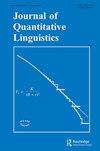依赖结构的定量分析
IF 1.7
2区 文学
0 LANGUAGE & LINGUISTICS
引用次数: 9
摘要
Russkom Jazyke vs Problemy I Rešenija)和不必要的音译规则混合(s, sh),在出版目录(CIP)中,人们发现编辑的俄语名字写得难以辨认,这肯定不是编辑的错。总而言之,本卷给出了一个很好的概述,目前的艺术在经验语言学,严重依赖于统计方法的特定子集应用。然而,卷的标题至少部分是误导,因为任何链接到目前的俄语和定量俄语语言学的研究是缺失的。重点显然放在(统计)语料库语言学,其中-正如本卷所示-统计方法无疑可以有效地应用,尽管主要嵌入作为归纳工具,以获得一般的经验倾向。考虑到俄罗斯数量语言学的丰富传统-代表着杰出的学者,如R. G. Piotrovskij, M. V. Arapov, J. a . Tuldava和J. K. Krylov,在许多其他-本卷似乎代表了一个“新”开始的应用定量方法的俄语,但绝不是后苏联和俄罗斯语言学一般。本文章由计算机程序翻译,如有差异,请以英文原文为准。
Quantitative Analysis of Dependency Structures
Russkom Jazyke vs Problemy I Rešenija) and an unnecessary mixing of transliteration rules (s, sh), and in the Cataloguing in Publication (CIP) one finds an illegible writing of the Russian names of the editors, which is surely not the fault of the editors. In sum, this volume gives a good overview of the current state of the art in empirical linguistics, relying heavily on the particular subset of statistical methods applied. However, the title of the volume is at least partly misleading, since any links to current studies on Russian and quantitative Russian linguistics are missing. The focus is clearly placed on (statistical) corpus linguistics, wherein – as this volume shows – statistical methods can doubtlessly be applied fruitfully, albeit mainly embedded as an inductive tool with which to obtain general empirical tendencies. Taking into account the rich tradition of Russian quantitative linguistics – represented by outstanding scholars such as R. G. Piotrovskij, M. V. Arapov, J. A. Tuldava and J. K. Krylov, among many others – this volume seems to represent a ‘new’ beginning of the application of quantitative methods of Russian, but by no means of post-Soviet and Russian linguistics in general.
求助全文
通过发布文献求助,成功后即可免费获取论文全文。
去求助
来源期刊

Journal of Quantitative Linguistics
Multiple-
CiteScore
2.90
自引率
7.10%
发文量
7
期刊介绍:
The Journal of Quantitative Linguistics is an international forum for the publication and discussion of research on the quantitative characteristics of language and text in an exact mathematical form. This approach, which is of growing interest, opens up important and exciting theoretical perspectives, as well as solutions for a wide range of practical problems such as machine learning or statistical parsing, by introducing into linguistics the methods and models of advanced scientific disciplines such as the natural sciences, economics, and psychology.
 求助内容:
求助内容: 应助结果提醒方式:
应助结果提醒方式:


